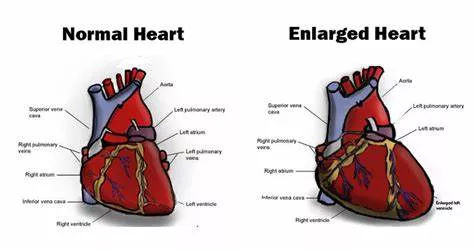An enlarged heart, also known as cardiomegaly, is a condition that can result from a variety of causes, including high blood pressure, heart valve disease, cardiomyopathy, and other underlying heart conditions.
Understanding the implications of an enlarged heart and whether it affects longevity is crucial for those diagnosed with this condition. This article delves into the causes, symptoms, treatments, and long-term prognosis of living with an enlarged heart.
Understanding An Enlarged Heart
An enlarged heart isn’t a disease in itself but rather a symptom of another condition. The heart can become enlarged temporarily or permanently, depending on the cause. When the heart is enlarged, its muscle walls may thicken, or the chambers may dilate, leading to compromised heart function. This can make it difficult for the heart to pump blood effectively, potentially leading to heart failure and other complications.
Causes of An Enlarged Heart
Several factors can contribute to an enlarged heart, including:
High Blood Pressure (Hypertension): Chronic high blood pressure forces the heart to work harder to pump blood, leading to the thickening of the heart muscle and eventually its enlargement.
Heart Valve Disease: Conditions such as aortic valve stenosis or mitral valve regurgitation can cause the heart to enlarge as it compensates for the faulty valves.
Cardiomyopathy: This group of diseases affects the heart muscle, causing it to enlarge, thicken, or become rigid.
Coronary Artery Disease: Blocked arteries can lead to heart attacks, damaging the heart muscle and causing it to enlarge.
Arrhythmias: Abnormal heart rhythms can also strain the heart, leading to enlargement.
Congenital Heart Defects: Some people are born with structural heart problems that can lead to an enlarged heart over time.
Other Conditions: Chronic kidney disease, thyroid disorders, and certain infections can also contribute to an enlarged heart.
Symptoms of An Enlarged Heart
Many people with an enlarged heart may not experience symptoms, especially in the early stages. When symptoms do occur, they can include:
- Shortness of breath, especially during exertion or when lying flat
- Fatigue and weakness
- Swelling in the legs, ankles, and feet (edema)
- Weight gain due to fluid retention
- Palpitations or irregular heartbeats
- Chest pain or discomfort
Diagnosis And Evaluation
Diagnosing an enlarged heart typically involves several tests, including:
Echocardiogram: This ultrasound test provides images of the heart’s size, structure, and function.
Chest X-ray: An X-ray can show the outline of the heart and whether it is enlarged.
Electrocardiogram (ECG or EKG): This test records the electrical activity of the heart and can detect abnormal rhythms.
Blood Tests: These can help identify underlying conditions that might cause the heart to enlarge.
MRI or CT Scan: Advanced imaging techniques can provide detailed pictures of the heart’s anatomy.
Treatment Options
The treatment for an enlarged heart focuses on addressing the underlying cause and managing symptoms. Treatment options may include:
Medications:
ACE Inhibitors and ARBs: These medications help relax blood vessels, reduce blood pressure, and decrease the heart’s workload.
Beta-Blockers: These reduce the heart rate and blood pressure, improving heart function.
Diuretics: These help remove excess fluid from the body, reducing the strain on the heart.
Anticoagulants: These prevent blood clots, which can be a risk in people with an enlarged heart.
Surgical Procedures:
Valve Repair or Replacement: Surgery to fix or replace faulty heart valves can improve heart function.
Coronary Bypass Surgery: This improves blood flow to the heart muscle by bypassing blocked arteries.
Left Ventricular Assist Device (LVAD): This mechanical pump helps the heart pump blood.
Heart Transplant: In severe cases, a heart transplant may be necessary.
Lifestyle Changes:
Healthy Diet: A diet low in sodium, saturated fats, and cholesterol can help manage blood pressure and heart health.
Regular Exercise: Moderate physical activity can improve overall cardiovascular health.
Weight Management: Maintaining a healthy weight reduces the strain on the heart.
Smoking Cessation: Quitting smoking improves heart health and reduces the risk of complications.
Limiting Alcohol: Reducing alcohol intake can prevent further damage to the heart.
Prognosis And Long-term Outlook
The prognosis for someone with an enlarged heart depends on the underlying cause, the severity of the condition, and the effectiveness of the treatment. Many people with an enlarged heart can live long, fulfilling lives, especially if the condition is managed effectively.
Factors Influencing Longevity
Early Detection and Treatment: Early diagnosis and prompt treatment of the underlying cause can significantly improve the prognosis.
Adherence to Treatment: Following medical advice, taking prescribed medications, and making lifestyle changes are crucial for managing the condition.
Regular Monitoring: Regular check-ups and monitoring can help detect any changes in the heart’s condition and allow for timely adjustments to the treatment plan.
Managing Comorbid Conditions: Effectively managing other health conditions, such as diabetes and high blood pressure, can improve overall heart health.
Conclusion
An enlarged heart is a serious condition that requires medical attention and lifestyle adjustments. However, with early detection, appropriate treatment, and proactive management, many people with an enlarged heart can live long and healthy lives. By understanding the causes, symptoms, and treatment options, and by making positive lifestyle changes, individuals with an enlarged heart can improve their prognosis and maintain a good quality of life. Regular medical follow-ups and adherence to treatment plans are key to managing this condition effectively.


